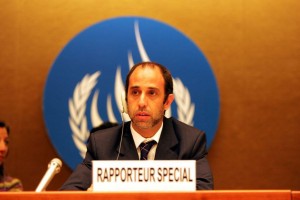The Karen Human Rights Group (KHRG) raised their concerns to the United Nations Special Human Rights Rapporteur, Mr. Tomas Ojea Quintana that now is not the time to repatriate Karen refugees back to Burma.
 KHRG told Mr Quintana that the Burma’s military still has a “shoot on sight” order in place in Karen State that affects people living in internally displaced hiding sites area and that the area is still heavily landmined.
KHRG told Mr Quintana that the Burma’s military still has a “shoot on sight” order in place in Karen State that affects people living in internally displaced hiding sites area and that the area is still heavily landmined.
On Tuesday, August 7, KHRG along with other Burma community based organizations, health care organizations and human rights groups based on the Thai-Burma border met with Mr Quintana in the Thai border town of Mae Sot.
Mr. Tomas Ojea Quintana, the United Nations Special Human Rights Rapporteur, had just returned from a six-day fact finding trip to Burma that included a visit to the Rakhine State, the scene of recent ethnic violence.
KHRG’s field director, Saw Albert, spoke to Karen News.
“We told Mr Quintana that human right violations are still going on in Karen State. The Burma Army still has not revoked its ‘shoot on sight’ order that is in place in areas where civilians live and work.”
Saw Albert said the ‘shoot on sight’ order had been used in recent months.
“In June, in Karen State’s Brigade 2 area, the Burma Army opened fire on a group of villagers on their way back from buying food. The villagers escaped, but lost all their food supplies. There have also been other reports of the Burma Army firing on villagers on their way to work in their rice fields.”
Saw Albert says the Burma Army are violating ceasefire arrangements agreed to in the recent ‘peace-talks’ between the Karen National Union and government representatives.
“The Burma Army opened fire on Karen villagers in their hiding areas that are also in the areas where the KNU have designated that the Burma Army are not to carry out military activities or patrols.”
Saw Albert said civilians living in those areas are terrified of the Burma Army seeing them.
“The villagers who are in hiding places still fear the Burma Army. They have to sneak when traveling to look for food or to earn their living.”
Saw Albert said one of the main concerns for refugees is landmines.
“The biggest issue for refugees, if they are going to be repatriated, is that there are a lot of landmines that have not been cleared.”
Saw Albert told Karen News that the United Nations Special Human Rights Rapporteur, Mr. Tomas Ojea Quintana’s fact-finding trip to Burma was not easy.
“Mr. Quintana told us that on his recent trip to Burma, the government denied him to access to Kachin State.”
The Burma Army has intensified its war against the Kachin Independent Army since June 2010. Attacks on villages have forced as many as 70,000 people to take refuge in temporary displaced people’s camps.
Thousands more have fled across the border into China.
Saw Albert said KHRG also raised a number of other issues with Mr. Quintana.
“There has been an increase in land confiscation related development – this has been carried out while ‘peace-talks’ are being held. The government has now categorized lands that were owned, but were abandoned by refugees when they had to flee, as empty lands. The government has sold the refugees land to businessmen. While some of the villagers farm lands that were taken by the Army to build their bases on – refugees who are going to be repatriated face the issue of what to do about their stolen land.”
The Karen Women Organization (KWO), secretary, Nan Dah Eh Kler, a community based organisation meet with the UN’s Mr. Quintana, she spoke to Karen News.
“We raised the issue of repatriating the refugees. There is still the need for a lot of consultations with the refugees themselves and also with organizations that work on refugee related issues. The government needs to explain us what their plans are, especially, if they have plans to repatriate refugees.”


